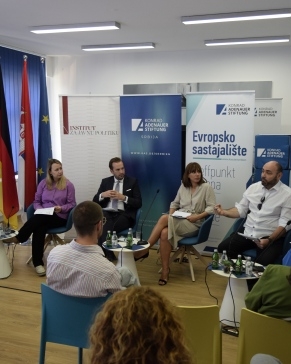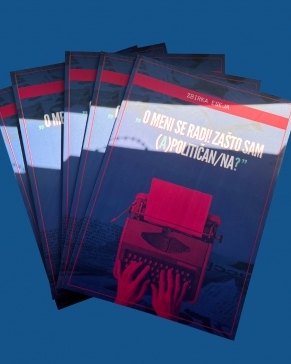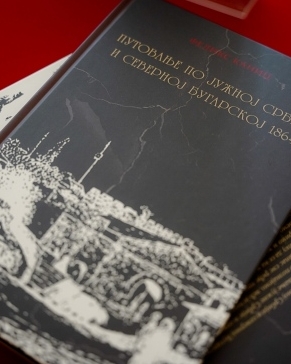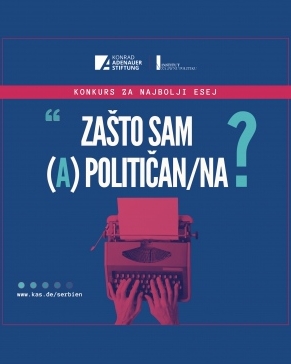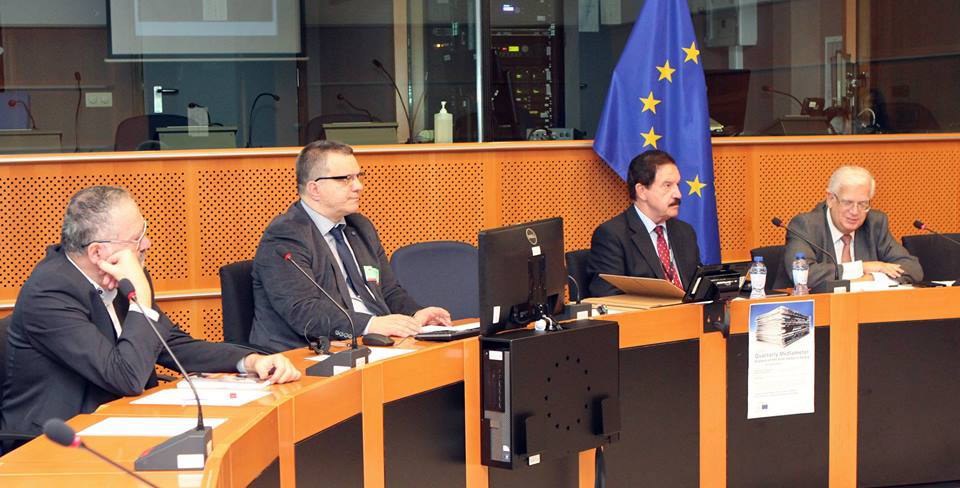
The presentation of the “Quarterly Mediameter – Analysis of the print media in Serbia” project has been held today in the European Parliament in Brussels.
Conference participants in Brussels were Velimir Ćurgus Kazimir, editor, and prof. Dejan Vuk Stanković, author of discourse analysis. Moderator of the event was Mr. Mario David, former MEP, Vice President of CDI and member of Public Policy Institute’s Board of Trustees, while the host of this event was MEP Mr. Fernando Ruas.

The main topics of discussion were research methodology and results, state of the Serbian media, media freedom and editorial policy. The focus was on professional and scientific analysis of the professional aspects of the print media editing, including their ability or inability, willingness or unwillingness to monitor, support or criticize the following important trends and elements of public policy:
- attitude towards EU, USA and Russia,
- attitude towards the neighboring countries and the region of Western Balkans,
- attitude towards economic changes
- attitude towards the NATO, alliance with Russia and military neutrality,
- attitude towards the past,
- attitude towards science, education, health, army, police, judiciary system, church,
- attitude towards the current government and opposition.

Mediameter’s database was presented at the conference, which could be used for analysis of media by all participants in Serbian public life. It has been pointed out that, based on this research, there are worryingly few articles on the European Union in second quarter of 2015 (only 53), which is even less than the number of articles dealing with the church and religion (65). It is important to note that 28.3% of all articles on European Union have a negative connotation. Especially interesting to the conference participants was the fact that, in the second quarter, most frequently mentioned among foreign actors in Serbian media was Vladimir Putin (66 texts). He is individually represented in the headlines almost as the three top officials of the EU together - Johannes Hahn (28), Federica Mogherini (24) and Jean-Claude Juncker (16).
Conclusion of this conference is that the print media in Serbia are biased to a large degree, and they are sharply divided along the government-opposition line.
“It would be expected that majority of texts are neutral, but we have determined that the majority of them are biased and clearly in favour of one side of debate, regardless of topic”, Velimir Ćurgus Kazimir has said for Tanjug. He pointed out that disproportionally large number of texts are completely founded on anonymous sources, while many of them appeared without visible cause or reason.

Analyst Dejan Vuk Stanković pointed out that the gap between pro-government and pro-opposition media is almost insurmountable. "When you read the statements of opposition leaders you get the impression that Serbia is a dictatorship and that the censorship is omnipresent, as if the country was ruled by Stalin", he said on the presentation in European Parliament, adding that government further fans the flames by accusing opposition for subversive action.
This analyst pointed out that great number of texts is clearly anti-European and that Russian president Vladimir Putin and Greek Prime Minister Alexis Tsipras are the most popular politicians by far, because the people perceive them as adversaries of the West and capitalism.
Franc Bogovič, MEP from Slovenia, responded with the comment that Tsipras is very popular in Slovenia as well and that people have propensity to listen to fairytales about rapid establishment of social justice and equality. "Serious reforms are difficult and unpopular, so there exists a need for strong leader to implement them, and then that leader is an easy target for criticism", he said.
Asked to comment on the fact that European Commission's report on European integration assessed that media freedom is an area in which no progress have been made during last year, Vuk Stanković said that media situation is objectively bad.
"We need greater transparency of media ownership and financing, but we also need different culture of informing, less impassioned and founded on a national consensus on important issues", he said in a statement for Tanjug.

In a previous telephone statement for Tanjug, Vuk Stanković has said that the latest findings, as well as the previous ones, show that talk about censorship in Serbian media is not grounded in reality. According to him, censorship is one topic used to criticize current government and one of the rallying points of opposition parties and one part of the public that is critically oriented towards the government. However, Mediameter project shows that the narrative about censorship is “too simplified version” of interpretation of relations between politics and media, Stanković has pointed out.
“Mediameter shows that, if you follow main pages of print media, you often have negative connotation regarding ministers, government or Prime Minister, while almost all weeklies continuously construct negative image of Serbian government, primarily by radical and open criticism of Prime Minister Vučić. It is hard to talk about censorship if we have that in mind”, Stanković remarked.
Journal “Quarterly Mediameter” is a joint project by Public Policy Institute and Ebart Media archive.
Source: Tanjug

